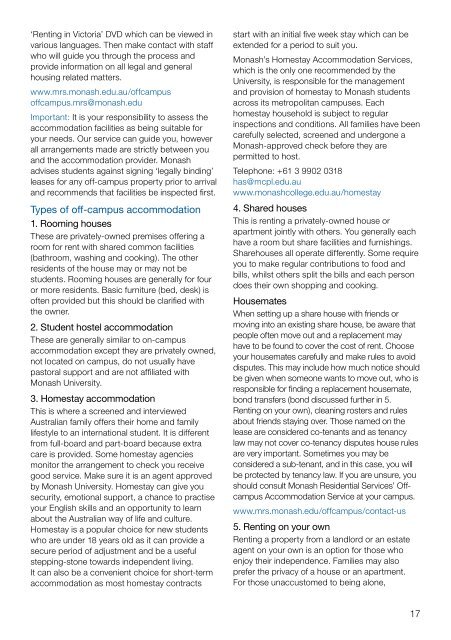Destination
Create successful ePaper yourself
Turn your PDF publications into a flip-book with our unique Google optimized e-Paper software.
‘Renting in Victoria’ DVD which can be viewed in<br />
various languages. Then make contact with staff<br />
who will guide you through the process and<br />
provide information on all legal and general<br />
housing related matters.<br />
www.mrs.monash.edu.au/offcampus<br />
offcampus.mrs@monash.edu<br />
Important: It is your responsibility to assess the<br />
accommodation facilities as being suitable for<br />
your needs. Our service can guide you, however<br />
all arrangements made are strictly between you<br />
and the accommodation provider. Monash<br />
advises students against signing ‘legally binding’<br />
leases for any off-campus property prior to arrival<br />
and recommends that facilities be inspected first.<br />
Types of off-campus accommodation<br />
1. Rooming houses<br />
These are privately-owned premises offering a<br />
room for rent with shared common facilities<br />
(bathroom, washing and cooking). The other<br />
residents of the house may or may not be<br />
students. Rooming houses are generally for four<br />
or more residents. Basic furniture (bed, desk) is<br />
often provided but this should be clarified with<br />
the owner.<br />
2. Student hostel accommodation<br />
These are generally similar to on-campus<br />
accommodation except they are privately owned,<br />
not located on campus, do not usually have<br />
pastoral support and are not affiliated with<br />
Monash University.<br />
3. Homestay accommodation<br />
This is where a screened and interviewed<br />
Australian family offers their home and family<br />
lifestyle to an international student. It is different<br />
from full-board and part-board because extra<br />
care is provided. Some homestay agencies<br />
monitor the arrangement to check you receive<br />
good service. Make sure it is an agent approved<br />
by Monash University. Homestay can give you<br />
security, emotional support, a chance to practise<br />
your English skills and an opportunity to learn<br />
about the Australian way of life and culture.<br />
Homestay is a popular choice for new students<br />
who are under 18 years old as it can provide a<br />
secure period of adjustment and be a useful<br />
stepping-stone towards independent living.<br />
It can also be a convenient choice for short-term<br />
accommodation as most homestay contracts<br />
start with an initial five week stay which can be<br />
extended for a period to suit you.<br />
Monash’s Homestay Accommodation Services,<br />
which is the only one recommended by the<br />
University, is responsible for the management<br />
and provision of homestay to Monash students<br />
across its metropolitan campuses. Each<br />
homestay household is subject to regular<br />
inspections and conditions. All families have been<br />
carefully selected, screened and undergone a<br />
Monash-approved check before they are<br />
permitted to host.<br />
Telephone: +61 3 9902 0318<br />
has@mcpl.edu.au<br />
www.monashcollege.edu.au/homestay<br />
4. Shared houses<br />
This is renting a privately-owned house or<br />
apartment jointly with others. You generally each<br />
have a room but share facilities and furnishings.<br />
Sharehouses all operate differently. Some require<br />
you to make regular contributions to food and<br />
bills, whilst others split the bills and each person<br />
does their own shopping and cooking.<br />
Housemates<br />
When setting up a share house with friends or<br />
moving into an existing share house, be aware that<br />
people often move out and a replacement may<br />
have to be found to cover the cost of rent. Choose<br />
your housemates carefully and make rules to avoid<br />
disputes. This may include how much notice should<br />
be given when someone wants to move out, who is<br />
responsible for finding a replacement housemate,<br />
bond transfers (bond discussed further in 5.<br />
Renting on your own), cleaning rosters and rules<br />
about friends staying over. Those named on the<br />
lease are considered co-tenants and as tenancy<br />
law may not cover co-tenancy disputes house rules<br />
are very important. Sometimes you may be<br />
considered a sub-tenant, and in this case, you will<br />
be protected by tenancy law. If you are unsure, you<br />
should consult Monash Residential Services’ Offcampus<br />
Accommodation Service at your campus.<br />
www.mrs.monash.edu/offcampus/contact-us<br />
5. Renting on your own<br />
Renting a property from a landlord or an estate<br />
agent on your own is an option for those who<br />
enjoy their independence. Families may also<br />
prefer the privacy of a house or an apartment.<br />
For those unaccustomed to being alone,<br />
17


